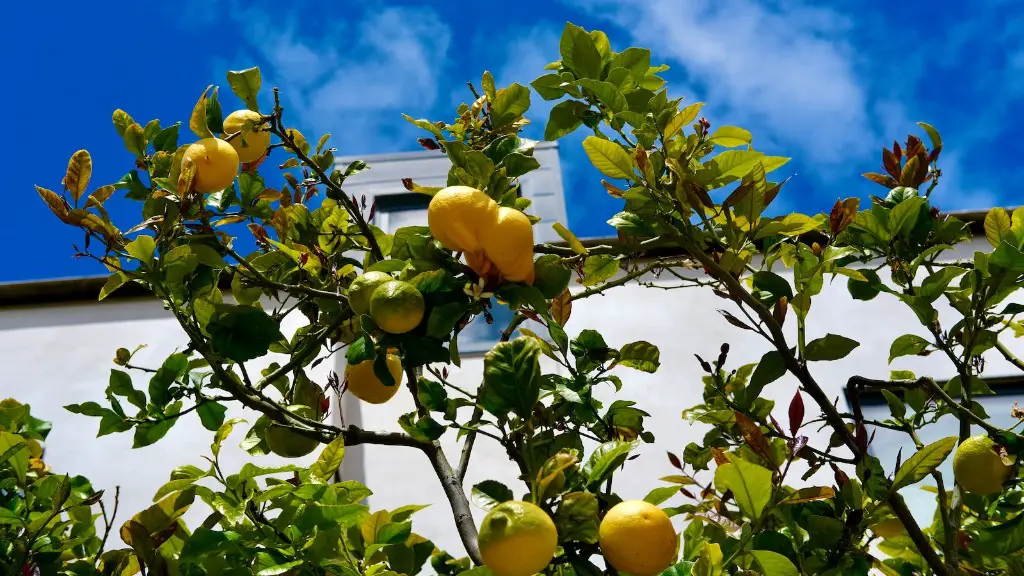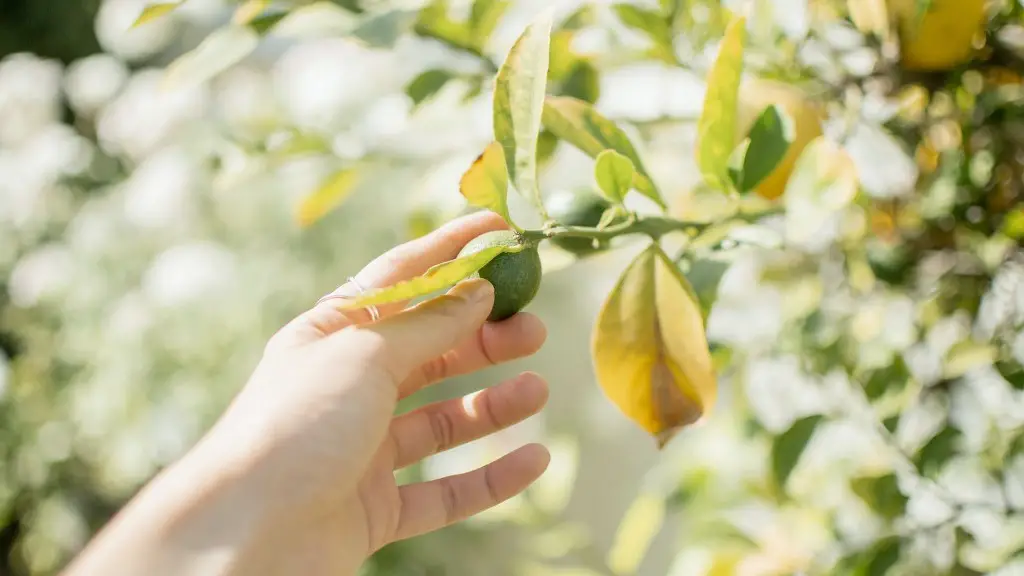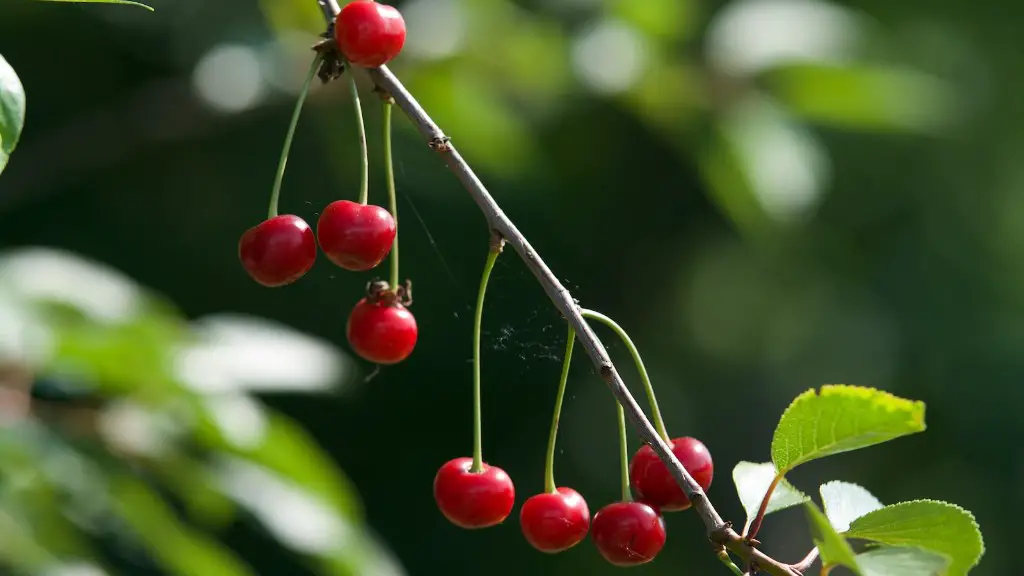Lisbon lemon tree cultivation is a popular and rewarding way to add a unique and sweetly tart flavor to your garden and patio. With minimal care and time devoted, you can have a fruitful and healthy Lisbon lemon tree. Here are some tips on how to grow a Lisbon lemon tree:
1. Purchase healthy and disease-free lemon tree seedlings. Seedlings should have a dark green foliage, a girth of at least three inches, and few weeds. Ask the nursery staff to ensure they meet lemon tree criteria.
2. Plant in a site that gets 8-10 hours of sun a day. The tree will do well in most soil, however, be sure to find a spot with good drainage. Sandy or loamy soils are best for Lisbon lemon trees. Dig a hole that is two to three times the size of the root ball, set the tree in the hole and fill it with soil.
3. For the first two months, water daily and keep the soil moist. When the tree is established, you can water the tree every-other-day. If the foliage begins to yellow, try adding mulch around the trunk to keep the moisture from evaporating.
4. Fertilize the soil every spring with a slow-release fertilizer. Start with a half-dose of fertilizer and work up until the tree reaches maturity. For developing lemon tree, feed once every three months.
5. Prune the Lisbon lemon tree in the spring season. Pruning encourages larger and more lemons by providing a balanced growth of the tree. Trim off any dead or damaged branches and cut back the tips of some branches.
6. Insects, disease and other detriments can damage Lisbon lemon trees. If you begin to see deteriorating foliage, try spraying the tree with a partial solution of rubbing alcohol or other insecticidal or fungicidal product.
7. Harnessing the energy of the sun can discourage insects and diseases. A reflective covering of aluminum foil mounted around the tree will help ward off some pest and keep the tree healthy. This method is a great addition to any preventive maintenance program.
Harvesting
When the Lisbon lemon tree starts to produce lemons, you will want to harvest them soon after they begin to turn yellow. Gently twist the fruit off the tree without damaging the branch. Unripened lemons can be left on the tree until they reach a bright yellow color.
Harvested lemons can be stored in the refrigerator for up to ten days. For longer keeping, you will need to freeze them. To freeze, start by washing and drying the lemons, then slice them into thin circles and spread out on a baking sheet overnight. Transfer them the next day to a resealable bag and store in the freezer.
Lemons can also be juiced and used in a variety of recipes. Invest in a quality juicer and you’ll be able to preserve your lemons for much longer. Lemon juice can be stored for up to a week in an airtight container in the refrigerator.
Companion Planting
Lisbon lemon trees benefit from companion planting. Planting flowers, herbs and vegetables around the tree can help protect it from pests and diseases, and increase the lemon tree’s yield. Plant herbs such as parsley, sage and oregano around the tree, and vegetables such as tomatoes, beans and chard. Tall flowers work well, like marigolds, daisies, and lavender.
Companion plants also act as soil enrichments, providing necessary nutrients that the lemon tree won’t get from the soil. Good examples include legumes like beans, peas and clover. As they grow, they’ll release nitrogen into the soil, helping to fertilize the Lisbon lemon tree.
The added benefit of companion planting is that it can provide natural pest control. Herbs have strong aromas that can confuse pests and keep them away from the lemon tree. Planting garlic, onion, chives and basil can be a natural form of pest control.
Remember, too much companion planting can crowd out the lemon tree. Plant cover crops and companion plants 6 to 12 inches away from the trunk to ensure that the lemon tree can get enough sun and air circulation, and that the roots aren’t being crowded out.
Lemon Tree Diseases
Lisbon lemon trees are susceptible to a variety of diseases, mainly caused by fungal infections, including Alternaria spp., Phytophthora spp., and Cercospora spp. The infection can spread and damage leaves, twigs, or fruit. To prevent this, avoid planting lemon trees near other diseased trees or if the soil is contaminated with disease.
If your Lisbon lemon tree is experiencing a fungal infection, you can try to treat the infection with homemade fungicidal sprays. Mix a solution of one tablespoon of baking soda and two tablespoons of mild dishwashing soap in two gallons of water and apply directly to the infected area. Repeat treatments every 2-3 weeks until the infection has cleared up entirely.
In order to protect the tree against future infections, you should practice proper hygiene. Remove any dead branches or leaves and maintain a clean area around the tree. Keep the grass around the tree trimmed, and avoid over-watering or overwatering to help prevent fungi growth.
Pest Control
Lisbon lemon trees are also susceptible to several pests, including aphids, mites, scale insects, and fruit flies. Mealybugs and ants can also be found on lemon trees. To control the pests, use a pesticide from your local garden center or create a natural repellent spray from the ingredients you have at home.
Mix one teaspoon of vegetable oil, a squirt of dish soap and two teaspoons of baking soda in two gallons of water. This solution can be sprayed directly on the afflicted areas of the tree. The key is to use a light spray and not over-saturate the tree. Try to use the spray during a cool day and avoid applying the solution during late afternoons or evenings.
Ladybugs are a great choice for natural pest control, as they feed on pest insects. Attracting Ladybugs to your garden will help keep the pest populations down naturally, without using chemicals.
Winter Care
Winter is an important time for lemon trees, as this is when the tree begins to put energy into new growth and flowering for the upcoming season. During winter, the tree will need to be kept warm and protected. Pine straw or special tree wraps can be used to cover the tree, providing an added layer of defense from frost. Also, make sure to keep the tree well-watered during cold winter days.
In areas where temperatures dip particularly low, it is recommended to mulch the tree with bark or hay. This will give the tree more insulation, and keep the soil around the tree warmer. For colder climates, it is recommended to bring the tree indoors during the coldest months.
In the winter months you will still be able to harvest Lisbon lemons. Keep an eye out to make sure they don’t become over-ripe. Unripened lemons can be stored in a paper bag and should keep for several weeks.





